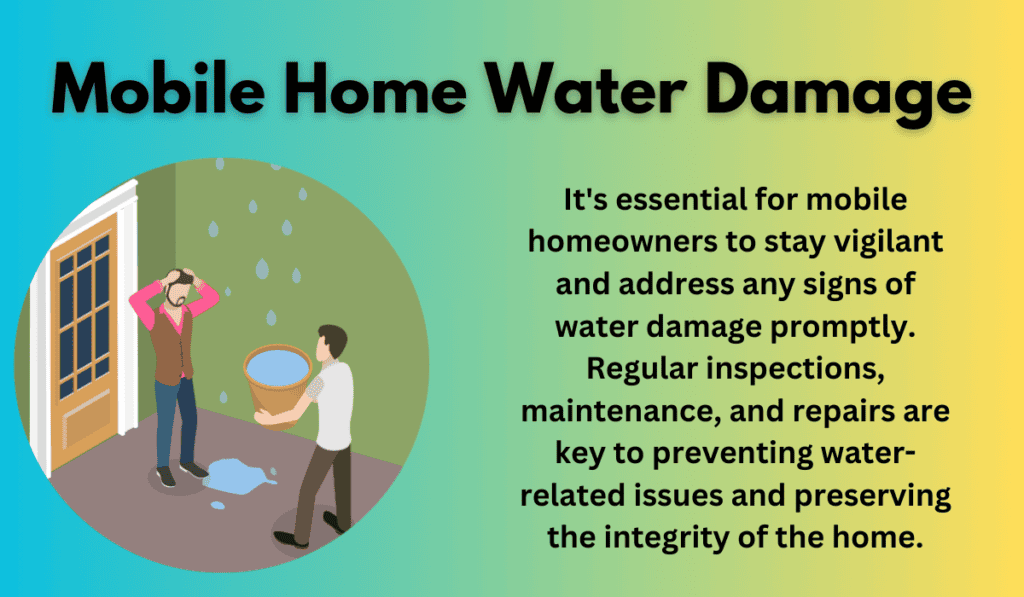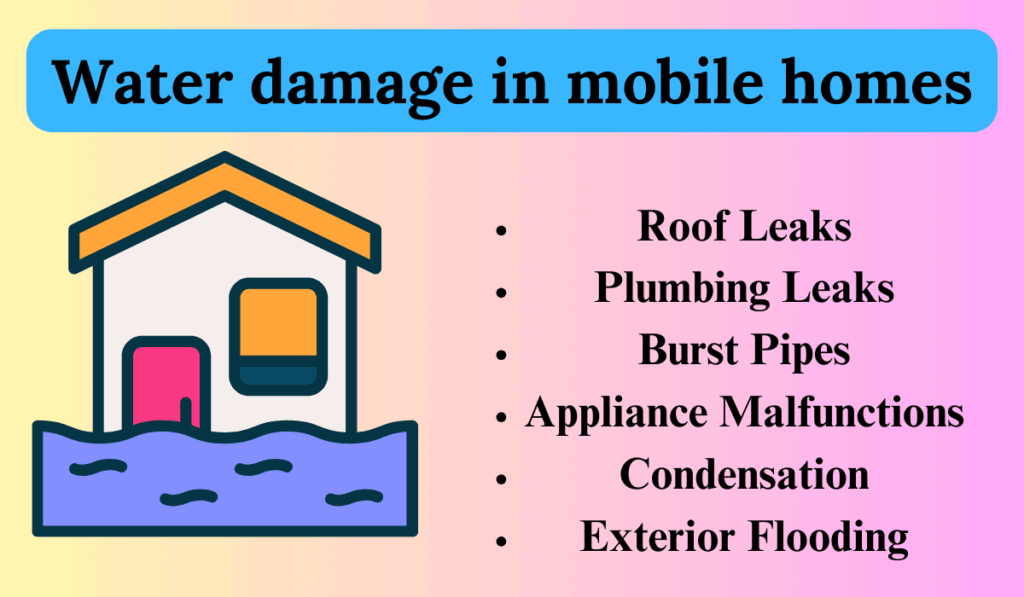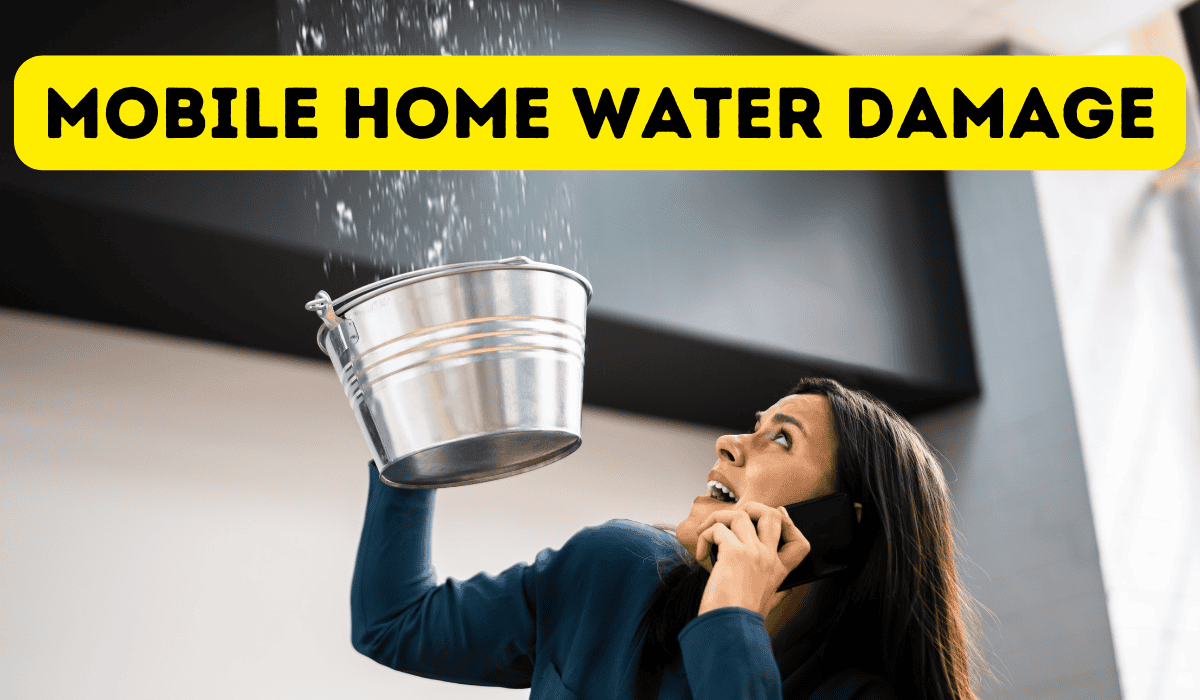Mobile Home Water Damage- As we discussed in our latest article “How to Fix a Water Leak in a Mobile Home: A Comprehensive Guide” we must identify mobile home water damages and leakages in our Mobile Home to avoid additional expenses and unexpected smells and all. In this article I’m going to give you brief on what type of water damages are caused in our Mobile Home due to silly mistakes.
The most crucial thing is to maintain Mobile Home. You bought beautiful Mobile Home, you have completed your dream with this and after couple of months you realized that “Mobile Home is also having many issues as we have to take care, to maintain that”.
Mobile Home Water Damage
Water damage in mobile homes is a serious issue that can cause a lot of problems for homeowners. There are a few reasons why it happens and things you can do to deal with it.
One big problem is leaks. They can start small, like a drip from a faucet, or they can be big, like a burst pipe. Leaks can mess up your home’s structure and cost a lot of money to fix, especially in mobile homes where the plumbing might not be as strong.
Another thing that can cause water damage is humidity. Mobile homes can get really humid, especially in places like the bathroom and kitchen. Too much moisture in the air can make mold and mildew grow, which isn’t good for your health or your home.
And then there’s flooding. It can happen if there’s a big storm or if a pipe bursts. Floodwater can ruin your carpets, floors, and furniture, and it’s a pain to clean up.
But don’t worry! There are things you can do to stop water damage from happening. Check your home regularly for leaks and fix them right away. You can also use a dehumidifier to take moisture out of the air, and make sure the ground around your home slopes away from it to keep water from flooding in.
So if you live in a mobile home, keep an eye out for water damage. With a little work, you can keep your home safe and dry.

Mobile home water damage repair
Mobile Home Water Damage- Repairing water damage in a mobile home is essential to prevent further deterioration and maintain the integrity of your home. Here’s a guide on how to tackle water damage repair:
Assess the Damage
Start by assessing the extent of the water damage. Look for signs of water stains, mold growth, soft or sagging drywall, warped flooring, or any other visible damage. This will help you determine the scope of the repairs needed.
Address the Source
Before repairing the damage, it’s crucial to address the source of the water. If the damage is due to a leaky roof, plumbing fixture, or other external source, fix the issue to prevent further water intrusion.
Remove Damaged Materials
Remove any materials that are beyond repair, such as waterlogged drywall, insulation, or flooring. Be sure to wear protective gear, such as gloves and a mask, when handling water-damaged materials to avoid exposure to mold and bacteria.
Dry Out the Area
Thoroughly dry out the affected area to prevent mold growth and further damage. Use fans, dehumidifiers, and open windows to promote air circulation and speed up the drying process. You may also need to remove moisture from subflooring or wall cavities using specialized equipment.
Treat for Mold
If mold is present, it’s essential to address it promptly to prevent health issues and further damage. Use a solution of water and detergent to clean moldy surfaces, then disinfect them with a mixture of water and bleach or a commercial mold remover. Allow the area to dry completely before proceeding with repairs.
Replace Damaged Materials
Once the area is dry and mold-free, replace any damaged materials, such as drywall, insulation, or flooring. Be sure to use materials that are suitable for use in mobile homes and comply with local building codes.
Seal and Paint
After replacing damaged materials, seal any seams or joints with caulk or sealant to prevent future water intrusion. Then, paint the repaired area to restore its appearance and provide additional protection against moisture.
Monitor for Future Issues
Keep an eye on the repaired area for any signs of recurring water damage, such as new stains or mold growth. Address any issues promptly to prevent further damage to your mobile home.
By following these steps, you can effectively repair water damage in your mobile home and restore its safety and structural integrity. If you’re unsure how to tackle the repairs or if the damage is extensive, consider consulting a professional contractor or water damage restoration specialist for assistance.
What types of water damage can happen to a mobile home?
Mobile Home Water Damage- Water damage can really throw a wrench in the gears of mobile home living. It’s like a sneaky intruder that can wreak havoc without warning. Whether it’s from a leaky roof, burst pipes, or flooding, water damage can have some pretty gnarly effects on your cozy little abode. Let’s dive in and take a look at what happens when H2O decides to crash the mobile home party.
First off, let’s talk about the walls. When water gets into those walls, it’s like a silent assassin. It creeps in and starts causing all sorts of trouble. You might start noticing stains or discoloration, and that’s just the beginning. If left unchecked, water can weaken the structure of the walls, causing them to warp or even collapse. It’s like a slow-motion disaster movie playing out in your living room.
Then there’s the flooring. Oh boy, don’t even get me started on the flooring. Whether you’ve got carpet, laminate, or hardwood, water can turn it into a soggy mess in no time flat. Not only does this make your floors look like a scene from a horror movie, but it also creates the perfect breeding ground for mold and mildew. And let me tell you, nobody wants to deal with a moldy mobile home.
But wait, there’s more! Let’s not forget about the ceiling. When water starts dripping from above, it’s like a cruel joke from Mother Nature herself. Those water stains on the ceiling? Yeah, they’re not just there for decoration. They’re a sign that something is seriously wrong up there. If you ignore them, you could end up with a ceiling that’s more hole than whole.
And don’t even get me started on the electrical system. Water and electricity? Yeah, they don’t mix. If water finds its way into your wiring, it can cause all sorts of chaos. From short circuits to electrical fires, the possibilities are enough to keep you up at night.
So what can you do to fend off the water damage beast? Well, first things first, you’ve gotta stay vigilant. Keep an eye out for any signs of water damage and address them ASAP. Fix those leaky pipes, patch up those holes in the roof, and make sure your gutters are doing their job. And if the worst does happen and you find yourself knee-deep in water, don’t panic. Call in the professionals and get that damage sorted out before it gets any worse.
In conclusion, water damage is no joke when it comes to mobile homes. From weakened walls to soggy floors, the effects can be downright devastating. But with a little vigilance and some timely repairs, you can keep the water damage beast at bay and keep your mobile home safe and sound.
Mobile Home Water Damage
Mobile Home Water Damage- Water damage in mobile homes can result from various sources, including leaks, flooding, or plumbing issues. This damage can manifest in different ways, such as:
- Roof Leaks: Water can seep through damaged or improperly sealed roofing materials, leading to stains, weakened structural integrity, and potential mold growth inside the mobile home.
- Plumbing Leaks: Leaky pipes or fittings can cause water damage to walls, floors, and ceilings. Over time, this can lead to mold growth, rot, and deterioration of building materials.
- Burst Pipes: Freezing temperatures or excessive pressure can cause pipes to burst, resulting in significant water damage and potential flooding within the mobile home.
- Appliance Malfunctions: Malfunctioning appliances like water heaters, washing machines, or dishwashers can leak water, leading to damage to surrounding areas and potential mold growth if not addressed promptly.
- Condensation: Poor ventilation or insulation can lead to condensation buildup, especially in areas like bathrooms and kitchens. Over time, this moisture can contribute to mold growth and deterioration of building materials.
- Exterior Flooding: Heavy rainfall or flooding from natural disasters can infiltrate the mobile home, causing water damage to floors, walls, and belongings.

Understanding the potential sources and types of water damage is essential for mobile homeowners to take preventive measures and respond promptly to mitigate any damage that occurs.
Categories of Water Damage Contamination
Sure thing! Water damage comes in different categories, each with its own level of severity and potential hazards. Let’s break it down:
Clean Water (Category 1)
- This is water that comes from a clean and sanitary source, such as a burst water pipe, a leaky faucet, or rainwater.
- While clean water may seem harmless, prolonged exposure can lead to mold and mildew growth if not properly dried within 24-48 hours.
- It’s generally safe to handle and clean up, but precautions should still be taken to avoid electrical hazards or slipping accidents.
Grey Water (Category 2)
- Grey water is slightly contaminated water that doesn’t contain sewage but may have some chemical, biological, or physical contaminants.
- This type of water often comes from sources like dishwashers, washing machines, or sump pump failures.
- Contact with grey water can cause discomfort or illness if ingested or if it comes into contact with open wounds.
- Special precautions should be taken when cleaning up grey water to minimize exposure and prevent further contamination.
Black Water (Category 3)
- Black water is highly contaminated and may contain sewage, chemicals, microbes, and other hazardous substances.
- This type of water is typically the result of sewage backups, flooding from rivers or streams, or water from storms or hurricanes.
- Black water poses significant health risks and should only be handled by trained professionals wearing appropriate protective gear.
- Direct contact with black water can lead to severe illness or infection, so extreme caution is necessary during cleanup and remediation efforts.
Understanding the categories of water damage is crucial for determining the appropriate response and safety measures. Whether it’s clean water from a burst pipe or black water from a sewage backup, swift action and proper precautions can help minimize damage and protect the health and safety of those affected.
conclusion
Mobile Home Water Damage- In conclusion, water damage in mobile homes is a serious issue that can lead to a multitude of problems if left unchecked. Whether it’s from clean water, grey water, or black water sources, the effects can range from structural damage to health hazards.
It’s essential for mobile homeowners to stay vigilant and address any signs of water damage promptly. Regular inspections, maintenance, and repairs are key to preventing water-related issues and preserving the integrity of the home. When water damage does occur, it’s crucial to act quickly and decisively. Hiring professionals to assess the damage and carry out the necessary repairs can help mitigate further harm and ensure the safety of occupants.
Additionally, understanding the categories of water damage is essential for determining the appropriate cleanup procedures and safety precautions. Whether it’s clean water, grey water, or black water, each requires a different approach to ensure proper remediation and minimize risks to health and property.
By staying proactive and informed, mobile homeowners can effectively protect their homes from water damage and enjoy a safe and comfortable living environment for years to come.
https://gomobilehome.com/: Mobile Home Water Damage
